Considering booking an Airbnb but not sure about the pros and cons compared to a traditional hotel? The list below will help you decide if an Airbnb or vacation rental is the best fit for you.
Have you ever rented a property through Airbnb or another vacation rental company? While short-term rentals have always existed, the founding of Airbnb in 2008 completely changed the game. Suddenly it was easy to find a unique, homey place to stay in practically any destination worldwide, and the rentals often delivered more space at a lower cost than many hotels.
During our trip to Scotland and Ireland with M’s parents, we bounced back and forth between traditional bed and breakfasts, small hotels, and Airbnbs. Not only was a two-bedroom apartment often less expensive than two separate hotel or B&B rooms, but it was also nice to share living space while traveling together. Similarly, when M and I took the kids on our first family vacation through New England, we also relied heavily on Airbnb. E was two and a half and S was five months, so being able to put them down for naps or bedtime in separate rooms and still have space for the two of us to hang out made a big difference.
Unfortunately, Airbnb’s disruption of the vacation rental game hasn’t been without its downsides… and some of them are pretty significant. With skyrocketing fees, a negative impact on housing markets, and strong backlash from local communities, Airbnb has come under a lot of fire recently.
So what does that mean for you? Should you use Airbnb on your next vacation, or should you stick to traditional hotels and other accommodations? To help you decide, I’ve compiled a list of some of the pros and cons of Airbnb and other companies like it. Read on to see whether this type of lodging is right for your next vacation!
A quick note: these pros and cons are specifically geared toward “Entire Place” Airbnbs, meaning you’re renting the full property rather than just a room.
(PS: Weighing your vacation options? I have also examined the pros and cons of cruising, all-inclusive resorts, and group travel.)
PRO: They're great for families and groups.
For solo travelers, couples, or groups of up to four people who don’t mind sharing a room and beds, a hotel works just fine. However, if you’re traveling in a larger group or have small or many children, hotel rooms can be a challenge. No parent wants to sit in the dark for hours after your child goes to bed at 7:30 PM, and you may not be comfortable with older children having their own, separate hotel room just so that everyone in a big family can have a bed.
With an Airbnb, you can rent properties with multiple bedrooms and shared living areas, allowing everyone to have the space he or she needs under one roof. Airbnbs also allow extended families or big groups to travel together, like taking a big getaway for Grandma’s 100th birthday or getting old college friends together for a week at the beach.
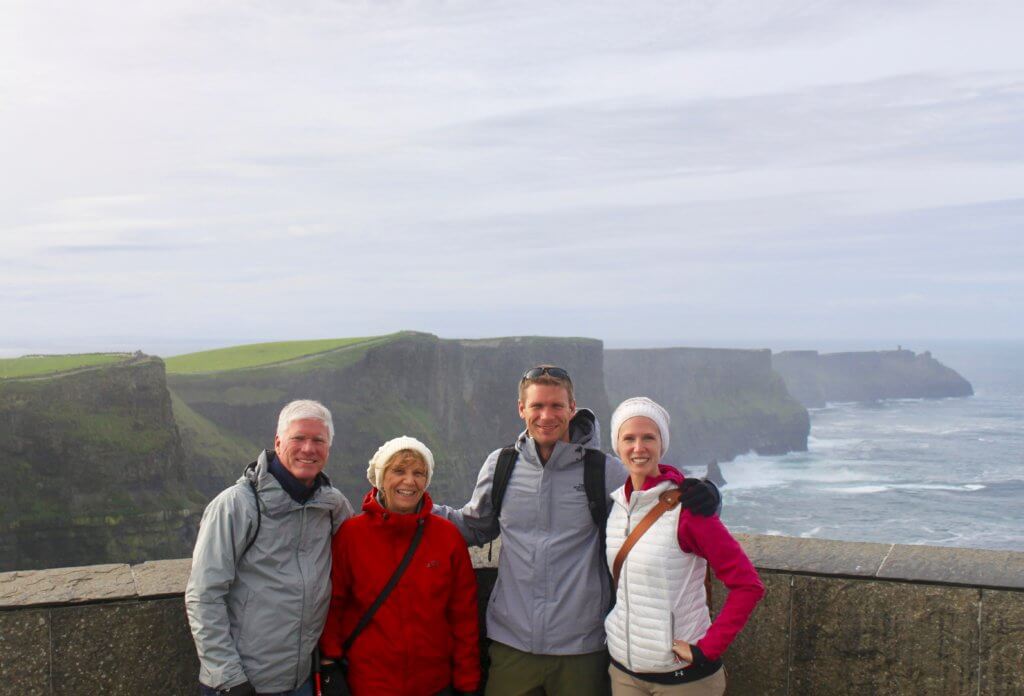
CON: Airbnbs are no longer the cheaper option.
In the early days of Airbnb, you would often save money – sometimes a lot of it – compared to booking a hotel room. This was especially true for solo travelers and couples who only needed or wanted small spaces, like one-bedroom apartments.
Nowadays, it feels like Airbnb prices have skyrocketed – and in most cases, they have. Not only have the actual rental prices gone up, but the added fees are killer. Between service fees (paid to Airbnb), cleaning fees (set by the owner), and local occupancy taxes and fees, the price of your rental can almost double from what is listed as the nightly rate.
For example, when we visited the White Mountains in New Hampshire, our three-bedroom Airbnb condo was listed at $179 per night, or what should have been $537. However, once the service fee ($97), occupancy fees ($71), and cleaning fee (a whopping $150) were added, our total came to $855, or $285 per night. Granted, we got three bedrooms (of which we used two) and extra living space, but that was still way more than we would have spent on our typical midrange hotel room.
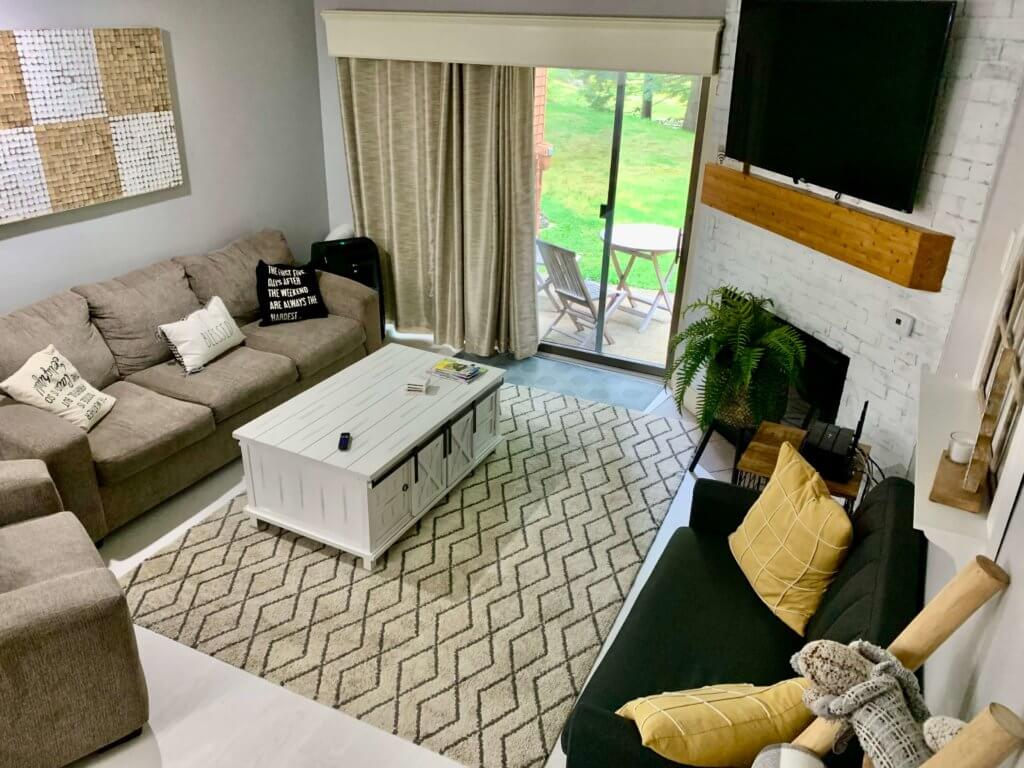
PRO: You get more space.
Similar to the point above about having more sleeping room for more people, Airbnbs are also great because you typically get more living space than a standard hotel room. At the very least, you will usually have access to a full kitchen and a living area. Depending on where you’re going, however, you could also encounter outdoor space, a pool, a game room, additional indoor living spaces, resort amenities, a rooftop, and more. If you’re looking to spend a lot of time enjoying your accommodations or relaxing in one spot, an Airbnb could be a great option.
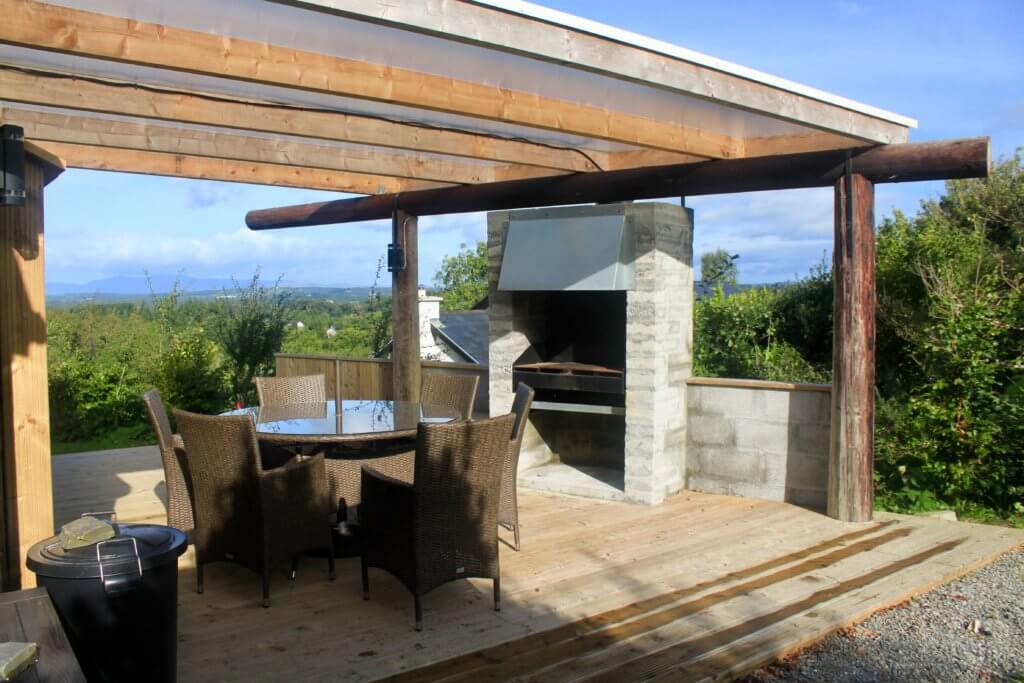
CON: You'll likely miss out on many amenities you'd find in a hotel.
Even with all that space, though, there are some benefits to staying at a hotel. For starters, there is no housekeeping service at an Airbnb to refresh towels, restock paper goods and toiletries, or tidy up throughout your stay. Similarly, there is no front desk staff, concierge, restaurant and/or bar, room service, or other services. Finally, although the host may have a security system or cameras installed (hopefully just outdoors, though there are plenty of stories of guests finding them inside, as well), there also is usually no security on the premises.
Staying in a hotel that employs front desk and housekeeping staff, a concierge, restaurant/bar workers, and other locals also helps the local economy, rather than just benefiting the single person (or, all too often, the corporation) that owns the Airbnb.
PS: Here are some tips for spotting hidden cameras in an Airbnb.
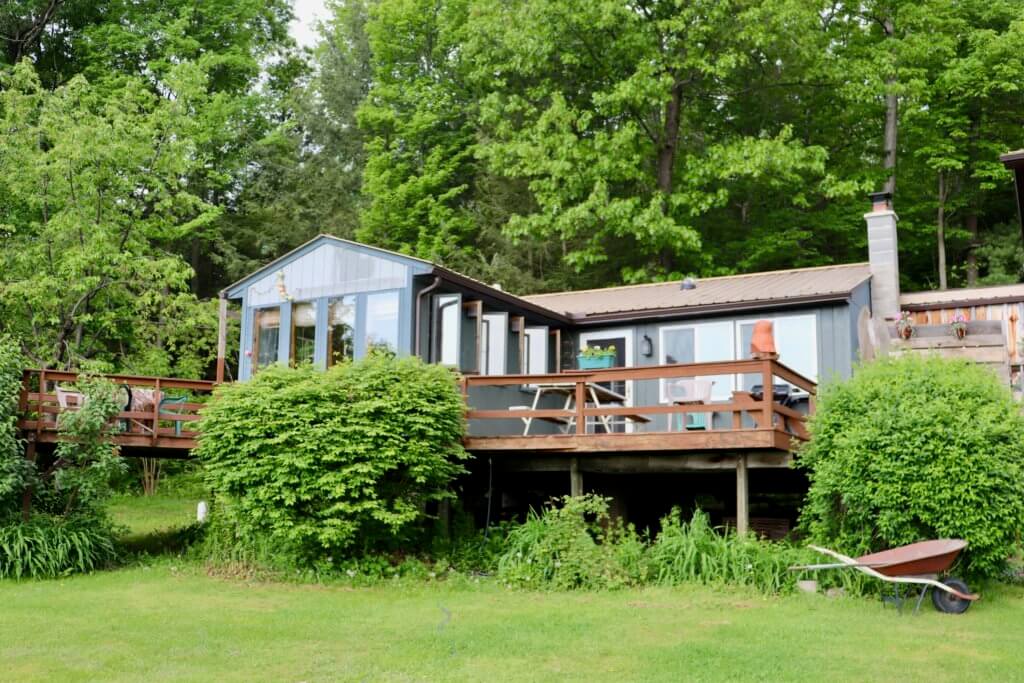
PRO: Many Airbnbs have a great aesthetic or unique features.
Let’s face it: standard hotel rooms can be a bit blah. Why would you stay in a square, boring room with mass-produced artwork and a few nondescript decorative touches when you could lodge somewhere that looks like it came straight out of a magazine? To be competitive, many Airbnb owners have put a lot of money and effort into decorating their properties, and it can feel like a real treat to stay there.
Then there are the unique properties, like the Airbnb where we stayed during our long weekend in the Finger Lakes. Situated on a working vineyard with a sloping view toward Keuka Lake, our rustic house made for the perfect retreat and had character to spare. Also notable was the apartment we rented on our trip to Edinburgh, Scotland, which was located in a 17th century building and featured a spiral stone staircase to our door.

CON: The house rules can be more restrictive, and you might even get some chores.
Because they are being rented out by individual owners, each Airbnb host is allowed to set the rules for his or her own property. Many of them make sense, like no smoking indoors and no parties that might cause damage or bother the neighbors. Other rules, however, can be incredibly nitpicky and even downright inconvenient, like narrowly specific check-in hours, instructions about what can or can’t be used in the apartment, or even a ban on cooking lobsters.
Similarly, while it’s common courtesy to tidy your hotel room a bit before leaving – aka don’t leave a mess behind – some Airbnbs take it one step further with a list of chores that must be completed before checkout. You may need to take out the trash, do the dishes, or strip beds, and I have even seen complaints touting requests to vacuum, clean the toilet and/or shower, or launder the bedding. Personally, I don’t mind dropping a trash bag in a bin or dumpster, but I take umbrage with orders to clean extensively when I’m already paying a cleaning fee.
Hotels are a lot more straightforward, and you won’t have to worry about being surprised by a bunch of house rules upon arrival.
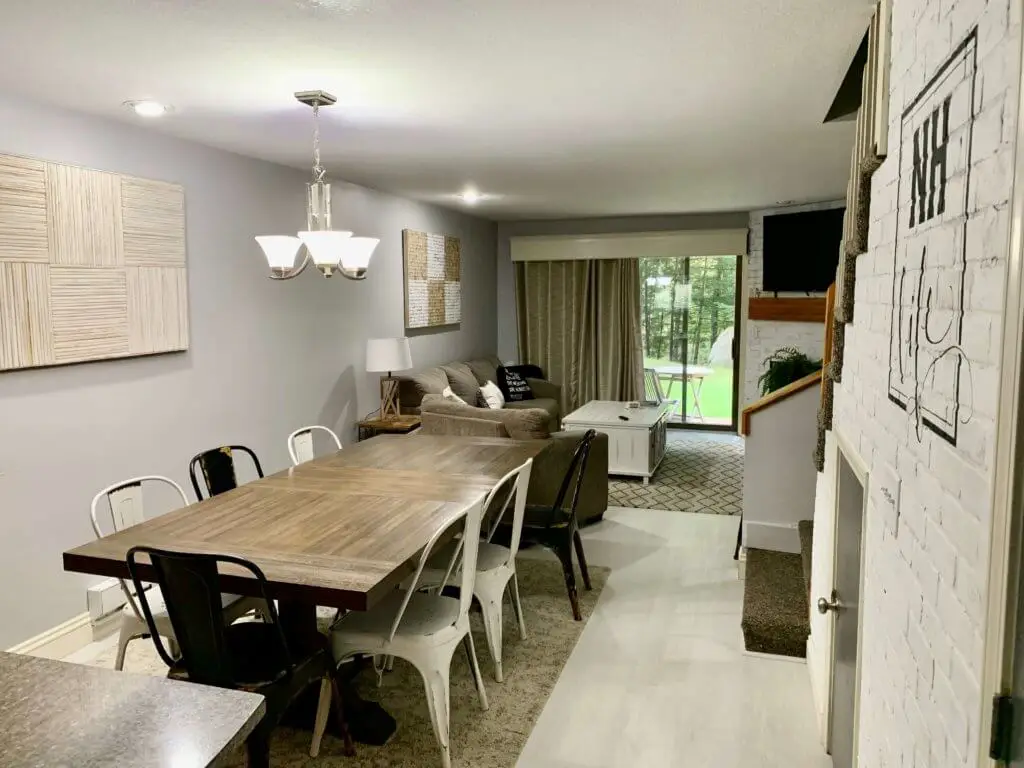
PRO: Some hosts really go above and beyond.
Many Airbnb hosts take a lot of pride in ensuring that their guests have a wonderful stay (and consequently leave great reviews). Their efforts, especially when compared to the transactional nature of many hotel front desk interactions, can have a real positive impact on your vacation.
We were delighted when we arrived at our cozy cabin in the Poconos and were greeted by a sweet gift basket with freshly-ground coffee, wine, s’mores supplies, and a welcome card. Frank, who hosted us in Killarney, Ireland, had written local guidebooks and was amazingly generous with his time in advising us on what to do in the area. (His wife’s homemade scones weren’t unwelcome, either!)
In researching Airbnbs for clients heading to beach locations, I’ve seen lots of properties offer umbrellas, beach chairs, beach towels, snorkeling equipment, and even kids’ beach toys, which is hugely convenient. Many hosts also put together helpful booklets or binders with some of their favorite local restaurants and activities, as well.

CON: Airbnbs are less regulated, and there could be some shady stuff going on.
The hotel industry is heavily regulated, with institutions required to adhere to certain standards to remain in business. They have to follow strict, consumer-protecting rules related to fire safety, insurance, cleanliness, lack of discrimination, and more.
Airbnbs, on the other hand, are largely unregulated and unsupervised. Does the property you’re visiting meet basic safety standards? Are they using security cameras appropriately? Is the unit clean? Is it even a legal operation? (For example, New York has strict rules about short-term rentals, rendering many Airbnb listings illegal.) There is also no protection against a host canceling your reservation at the last minute for no reason, which could really leave you in the lurch.
I’ve stayed in some spotless Airbnb’s, but I’ve also stayed in a couple that made me feel like I was crashing at a friend’s college apartment that hadn’t been cleaned since the start of the semester. Make sure to read reviews carefully before booking.
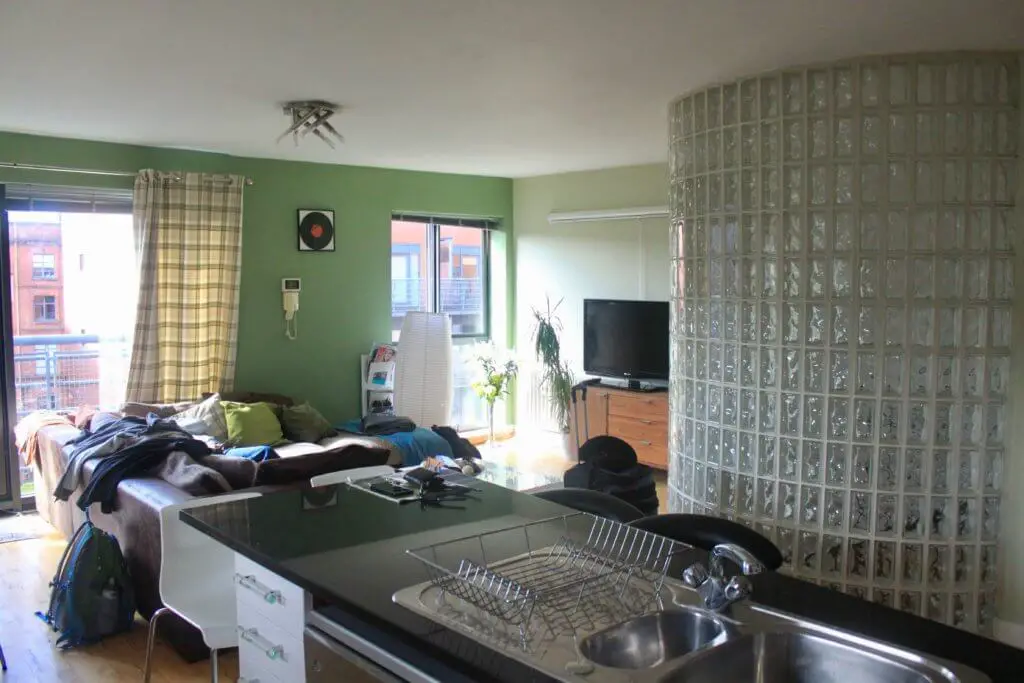
PRO: You'll feel more at home.
Staying in a house or apartment has a much different feel than staying in even the most delightful boutique hotel. You’re in a place that’s meant to feel like home, with all the amenities and touches that that requires.
After a long day of exploring a new place, it’s nice to be able to come back to a home, where you can splay out on a couch, play a game around a table, or make a snack in a kitchen. Airbnb’s are also often located in residential neighborhoods, giving you a glimpse into local life and getting you away from the hustle and bustle of tourist areas.
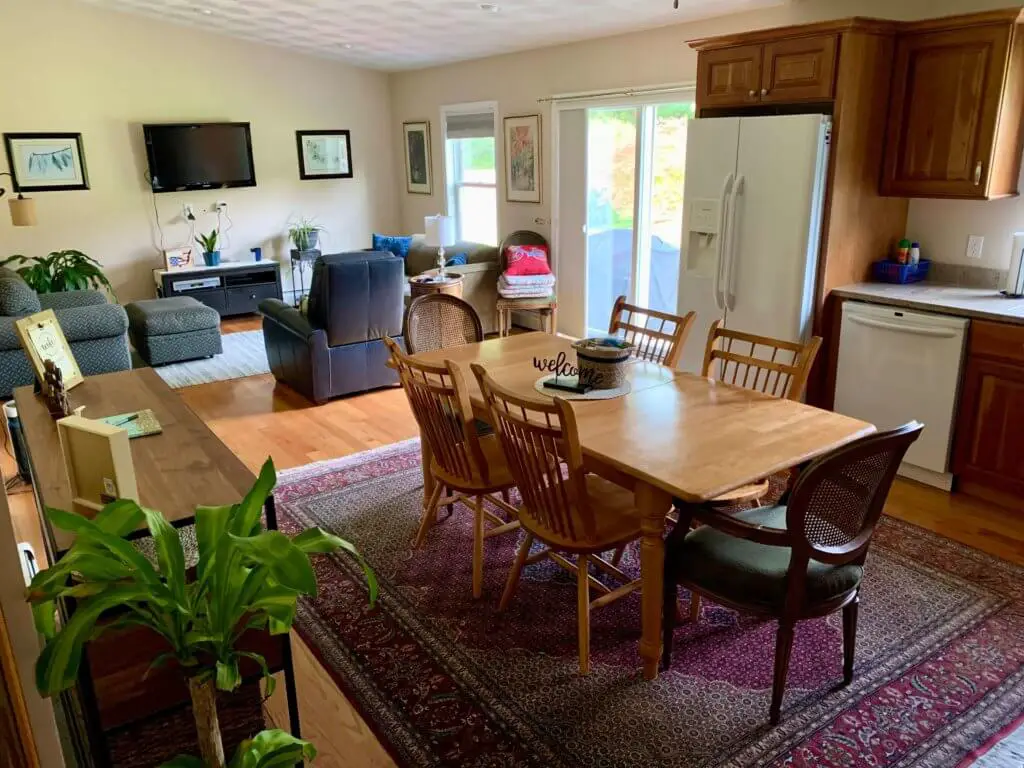
CON: Airbnb is negatively impacting housing markets in a major way.
Although the increasingly high fees, lack of regulation, and before-you-leave chore lists are annoying, the blackest mark against Airbnb is the impact that it is having on housing markets, particularly in urban areas. In cities like New York, Amsterdam, Barcelona, and more, locals are being priced out of their own neighborhoods by wealthy investors who snap up available properties to use as short-term rentals. Furthermore, because short-term rentals tend to be much more lucrative than long-term, the explosion of Airbnb has devastated many rental markets and made it almost impossible for people to find affordable places to live. In places like the cities above, which already suffer from huge tourist crowds, locals are fed up and in some cases have become actively antagonistic toward visitors.
Even if the housing market is doing fine, Airbnb’s have caused a major headache for neighbors who have to deal with a constant flow of new strangers into nearby homes. From noise complaints to damaged property, living next to or near an Airbnb can be a real hassle and create a lot of neighborhood tension.
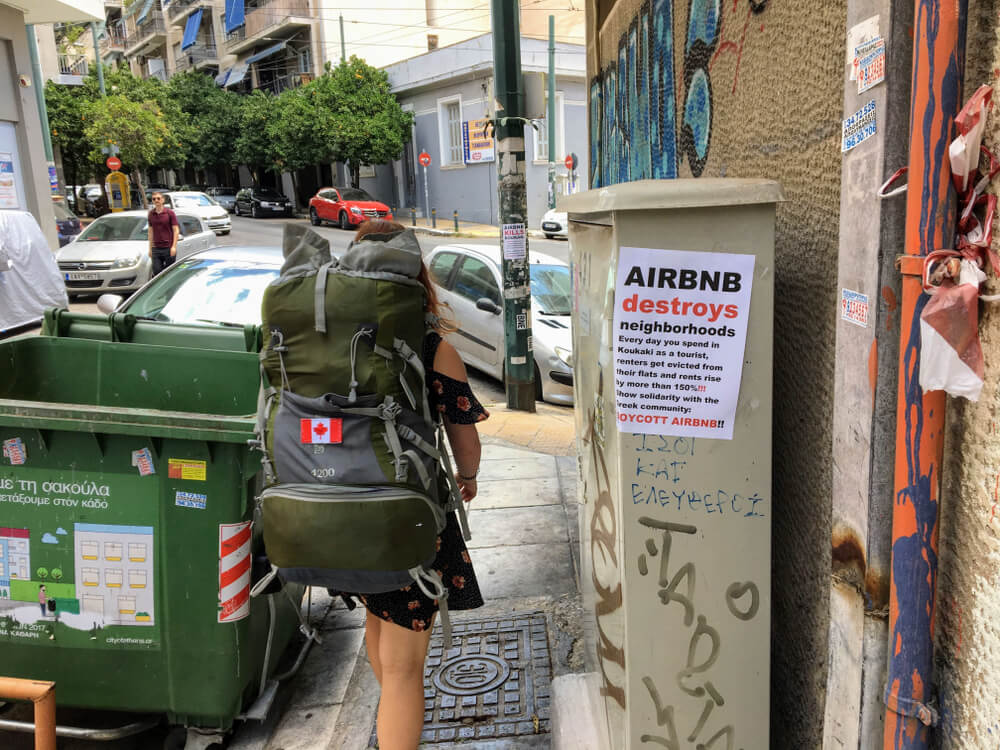
Thankfully, there are ways to use Airbnb responsibly and mitigate the negative impact your stay might have. Here are a few:
- Avoid using Airbnb in areas that suffer from overtourism or where the platform has caused harm to the housing market. Choose hotels, preferably locally-owned boutique hotels and guesthouses, instead.
- When booking an Airbnb, try to select a property that is owned by a single family or individual, not a rental corporation or investors who are managing tons of properties. You won’t always be able to tell if the owner is part of the problem or just a person renting out a second or investment property, but it’s worth a try. The easiest way to check is by clicking on the host’s photo in the “Hosted by” section. This will take you to their host page, where you can see all their listings and read an “About” statement if they’ve provided one.
- And finally, be respectful of your neighbors and neighborhood when staying in your short term rental. This includes keeping your noise at a reasonable level, respecting neighbors’ property and space, and obeying all posted house and community rules.
The advent of Airbnb revolutionized the way we travel and how we think about vacation accommodations. There are a ton of benefits to renting through Airbnb, especially for families and groups, but the platform also has some real drawbacks.
I hope this post has helped you decide whether or not Airbnb is right for you, and I’d love to hear your thoughts in the comments. What has been your experience using Airbnb?
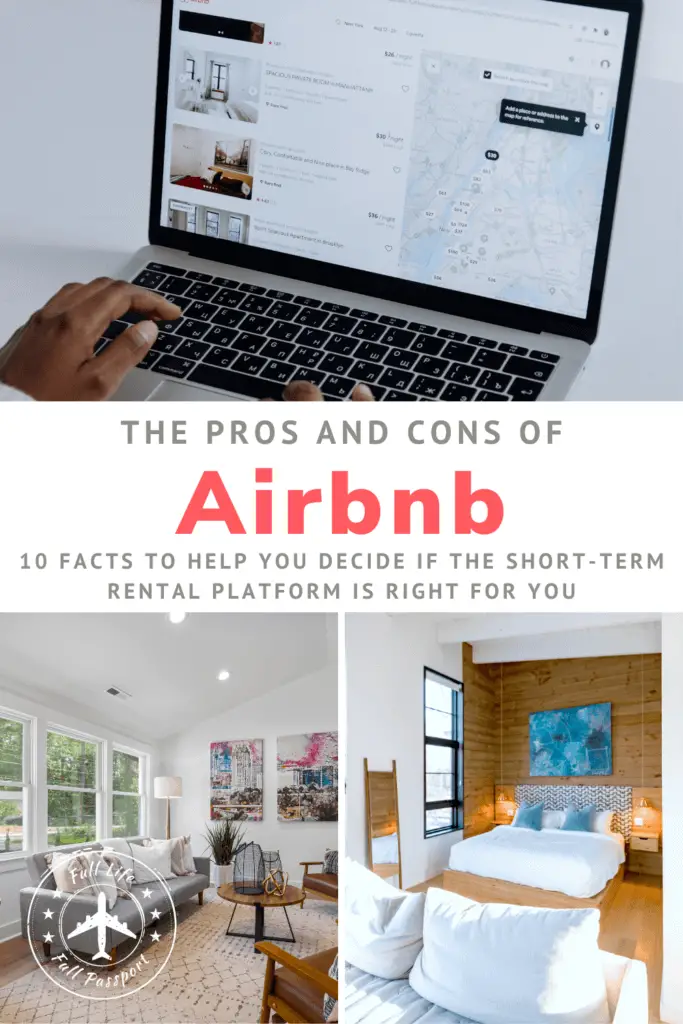
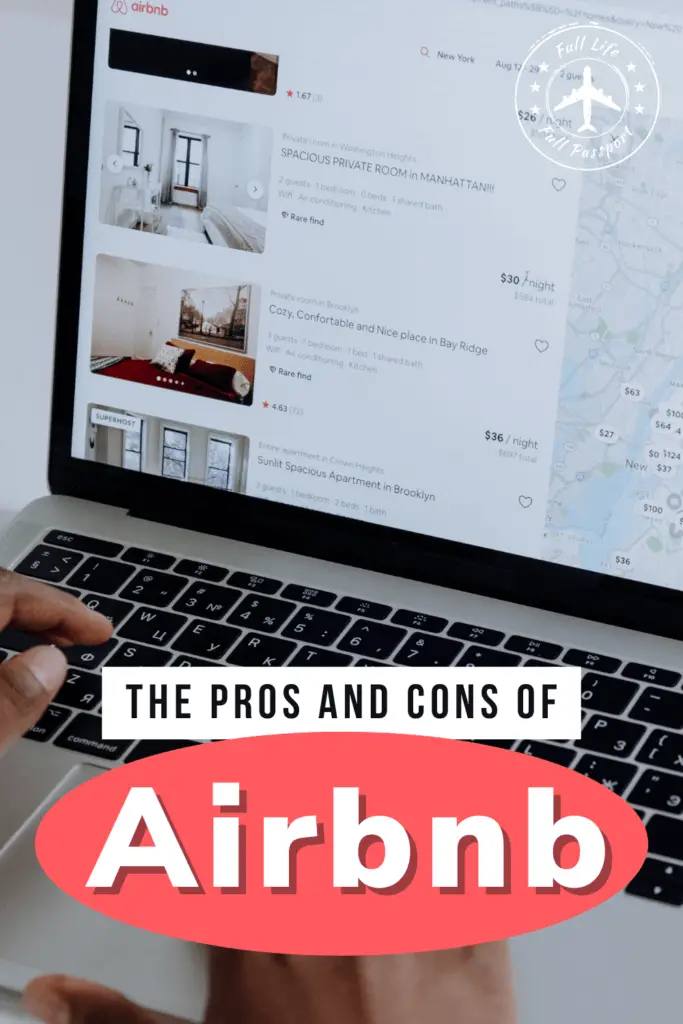
Like the post? Pin to save or share!
More Travel Pros and Cons:
Read More Great Content:
Need some help planning your next trip or choosing the best Airbnb? Full Life, Full Passport offers customized planning services for all kinds of vacations and budgets!
Want to be the first to know when a new post is published, or to receive exclusive content directly to your inbox? Join our email list!
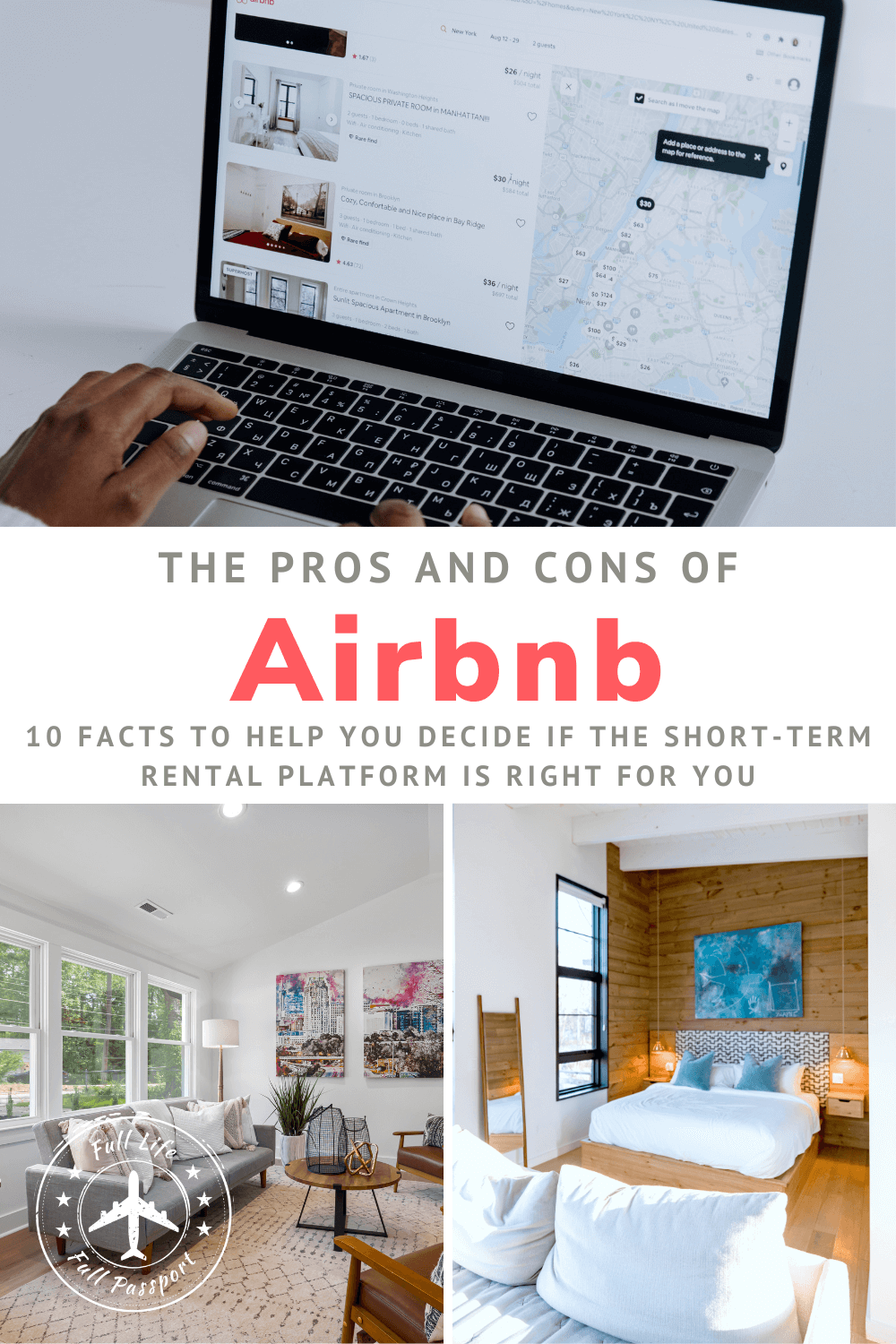
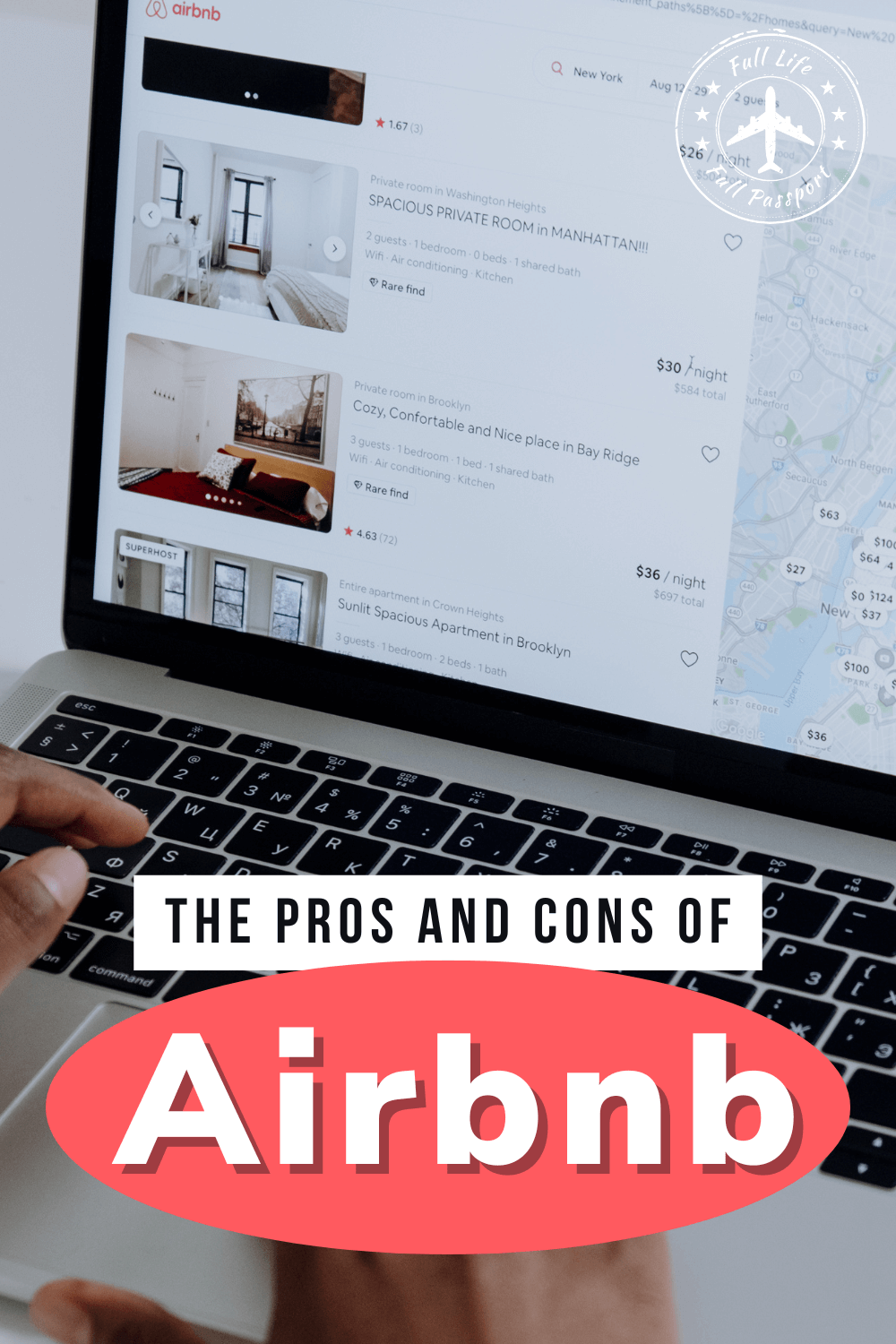

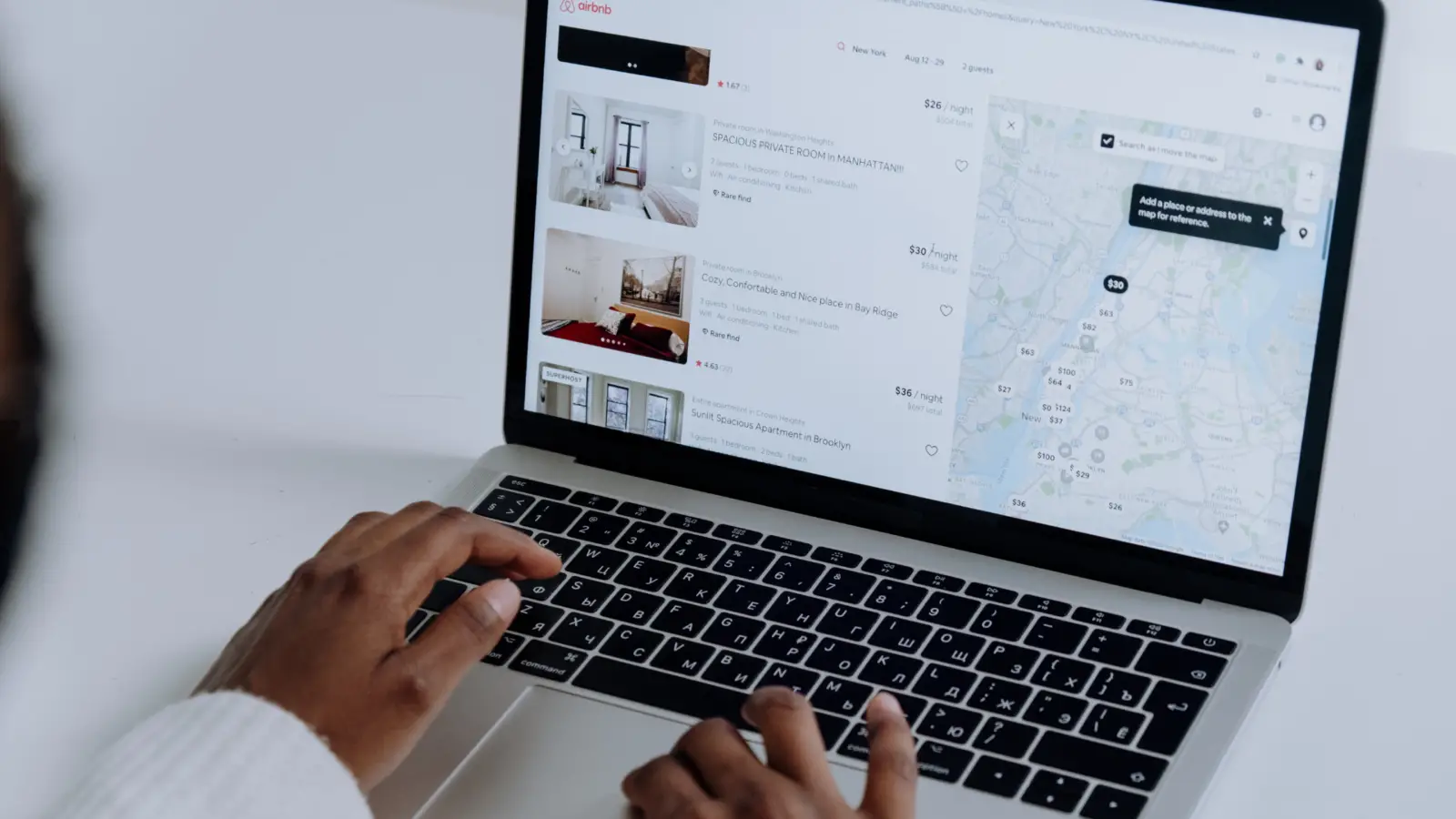
 Helpful Tips for Traveling with Your Dog [From a Vet!]
Helpful Tips for Traveling with Your Dog [From a Vet!]

This is a great article. Just rented our first vrbo in April to visit from in our old community. It was great to invite a couple of friends over for games and drinks and not have to sit in the hotel breakfast area. I’ve been hearing a lot since then about how these rentals are taking housing options away from people who want to buy a home to live in the area. How do you know if it is one of these “overtouristed” communities?
Thanks so much, Audrey, and I appreciate your thoughtful question. You’re correct that, unfortunately, the profitability of short-term rentals has increasingly drawn investors who often end up pushing out locals due to rising real estate prices and/or a lack of long-term rental availability. While you can’t always tell if the Airbnb you’re renting has negatively impacted the community, I generally try to do a little research into the area that I’m visiting first. Have they recently seen a surge in tourism? Is it a super popular destination? Can you find any articles or discourse online about local governments trying to crack down on short-term rentals or residents complaining about housing availability/affordability? All of those would be good indicators that a hotel might be a more sustainable option.
I would also suggest taking a look at the Airbnb owner’s profile to see if it’s a single person renting out their own home or a vacation property (totally fine, that was originally the whole point of Airbnb!) or if it’s a big company/management group/investor who has lots of different properties. While the big investors often have big, flashy, Instagram-friendly properties, I would try to support a smaller owner to keep your dollars more local.
I hope that helps! Thanks again for asking the question and for your concern in being a responsible tourist! Let me know if I can do anything else 🙂